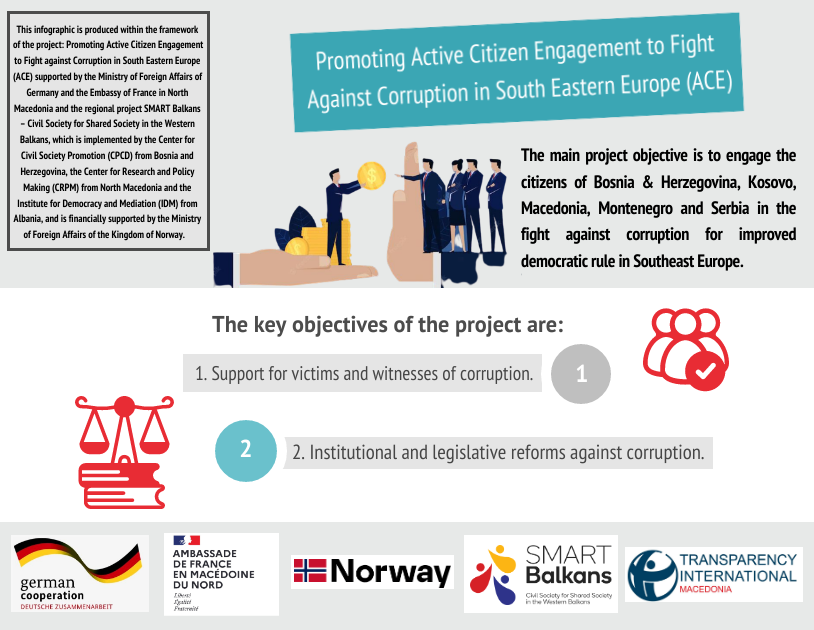Project: Promoting Active Citizen Engagement to Fight Against Corruption in South Eastern Europe (ACE)
Duration: July 2022 – June 2024
Donor: Ministry of Foreign Affairs of the Federal Republic of Germany, Embassy of France in North Macedonia and the regional project SMART Balkans – Civil Society for Shared Society in the Western Balkans, which is implemented by the Center for Civil Society Promotion (CPCD) from Bosnia and Herzegovina, the Center for Research and Policy Making (CRPM) from North Macedonia and the Institute for Democracy and Mediation (IDM) from Albania, and is financially supported by the Ministry of Foreign Affairs of the Kingdom of Norway.
The project is being implemented by Transparency International Secretariat in Berlin in collaboration with the national chapters of Transparency International in Bosnia and Herzegovina, Kosovo, Macedonia, Serbia and the partner organization MANS from Montenegro.
The overall objective of the project is To enable rights holders and duty bearers in BiH, Kosovo, North Macedonia, Montenegro and Serbia to participate in the fight against corruption towards improving the quality of democratic governance in the Southeast Europe.
Specifically, the project is intended to achieve the following objectives:
- Victims and witnesses of corruption supported to seek redress for their grievances
- Actions to bring about change to anticorruption legal and institutional frameworks on national and regional levels are empowered
Expected results:
- Legal advice and advocacy assistance provided to witnesses and victims of
corruption, including whistleblowers - Awareness raising campaigns on ALAC (Advocacy and Legal Advice Centres) services conducted among citizens
- Strategic advocacy undertaken on legal, administrative and institutional systemic improvements needed in the fight against corruption
- Advocacy initiatives conducted for improved and enforced national whistleblowing legislation, in line with the EU Directive on Whistleblower Protection and best practice
Activities:
- Receive and record safely client’s complaints
- Provide advice and support clients in pursuing their corruption related grievances and safely blowing the whistle
- In the case of TI Serbia, KDI, TI Macedonia and MANS: Adoption and usage of the GlobaLeaks online reporting tool, for whistleblowers and other citizens to safely, anonymously and confidentially report to, and communicate with specialised ALAC staff for technical and legal aid
- In the case of TI Serbia, KDI, TI Macedonia and
MANS: Adoption and usage of a secure case management system (Salesforce) developed by TI-S for managing corruption cases, and analysing the complaints received to identify systemic weaknesses and loopholes in high-risk sectors (corruption risk analysis). - Represent clients in court when appropriate
- Recommend referrals to a prosecutor body and provide legal advice
1.2.1. Production and dissemination of outreach material on ALAC services
1.2.2. Public promotion of the ALAC services, including media outreach to inform decision makers and broader public on corruption issues and availability of service
1.2.3 Provision of technical support and training to ALACs on case management systems and methods on corruption risk analysis
2.1.1. Identification of corruption risk areas
2.1.2. Development and dissemination of policy recommendations
2.1.3. Coalition building with state and non-state actors
2.1.4. Strategic litigation/court action/ submission of official complaints to authorities
2.1.5. Partnership building with governmental institutions
2.2.1. Organise joint project meetings/webinars with TI chapters in the EU to share knowledge and experience to advocate for whistleblowing legislation to be in line with the EU Directive and best practice.
2.2.3. Outreach campaigns promoting the value of whistleblowing, to foster public demand for robust whistleblowing protection, encourage corruption reporting, and promote TI’s ALAC safe reporting channels.
2.2.4. Developing recommendations for needed reforms to align national whistleblowing legislation with the EU Directive and best practice and improve implementation and enforcement, drawing from experience in other countries shared by national chapters about best practice and what does not work in practice.
2.2.5. Advocacy and communication activities for improved whistleblower protection in South East Europe countries
2.2.6. Building/reinforcing coalitions with relevant stakeholders (e.g. civil society organisations, academia, journalists associations)


